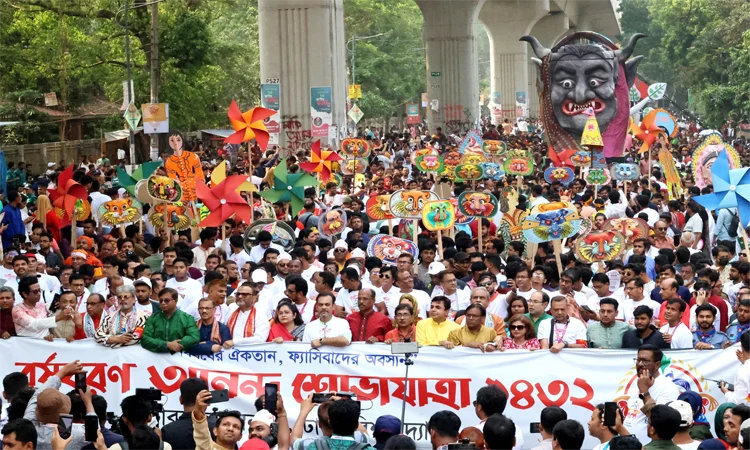News Flash
News Flash

DHAKA, April 16, 2025 (BSS) - With the celebration of Pahela Boishakh, Bangla Noboborsho-1432 was welcomed with enthusiasm and inclusive messages of peace for the very first time as people from all walks of life welcomed the New Year spontaneously.
Organised entirely under the interim government's supervision, this year's Pahela Boishakh celebration brought together people from all communities and ethnic groups, making the festival a universal occasion.
Roads across the country, including those in Dhaka, became vibrant with the tune 'Eso He Boishakh' and traditional Bengali folk songs, accompanied by exhibitions, rallies, Alpanas, and colourful festoons.
People of all ages, dressed in colourful attire, thronged various places, including Ramna Batamul to Shahbagh, Suhrawardy Udyan to Dhaka University, the High Court to the Press Club, and the surrounding alleys from dawn until dusk.
Taijul Islam, a student of Dhaka University, said, "The celebration of Pahela Baishakh reflected a long-awaited return to festivals that resonate deeply with the heart and roots of the nation."
Shafiqul Islam, an entrepreneur, who came to Ramna Batamul with his family, told BSS that the celebration of the New Year has become a universal occasion as people, regardless of race, religion, and caste, took part in the festivity amid enthusiasm.
He said, "This celebration is unique, as people of the country could not express their joy during the tenure of the previous fascist government."
On the occasion, a concert was organised at Suhrawardy Udyan, Ananda Shobhajatra was taken out from the Fine Arts Faculty of Dhaka University, and day-long events were held at Rabindra Sarobar.
Other main attractions of the day were a concert and drone show at Manik Mia Avenue in the afternoon, making people enthralled with the memories of the July mass uprising.
Afsana Bilkis, a teacher by profession, expressing gratitude to the interim government for arranging such an event, said, "The nation would remember the martyrs of the July uprising forever."
Welcoming the New Year, Bangladesh Shilpakala Academy, cultural groups from three hill districts and other ethnic groups took out a procession in the capital. The Bangla Academy and Bangladesh Small and Cottage Industries Corporation (BSCIC) organised Boisakhi Mela on Bangla Academy and Bangladesh Folk Arts and Crafts Foundation premises.
Boishakhi Mela (fairs) were also held at different places across the country, displaying handicraft products along with pottery and traditional foods.
Special features have been published in newspapers highlighting the significance of Pahela Boishakh. Bangladesh Television, Bangladesh Betar and private television channels, as well as other print and electronic media, published and broadcast special articles and programmes, respectively.
Personnel from RAB, police and other law enforcement agencies ensured strict surveillance across the country, including Dhaka, around celebration spots.
With law enforcement agencies on high alert to avert any untoward situation and continuous police and intelligence surveillance on both physical and cyber fronts to prevent harm or the spread of misinformation, the Pahela Boishakh celebration proceeded peacefully, with no unseemly incidents reported so far.
Due to the tireless efforts and dedication of the government and law enforcement agencies, the countrymen celebrated the Bengali New Year Year-1432 in a festive and peaceful manner.
The first Pahela Baishakh event in Bangladesh was held in 1951 by an organisation named 'Lekhak-Shilpi-Majlish - led by some renowned educationists, artists and journalists. Then Chhayanaut debuted Pahela Baishakh at Ramna Batamul in 1967.